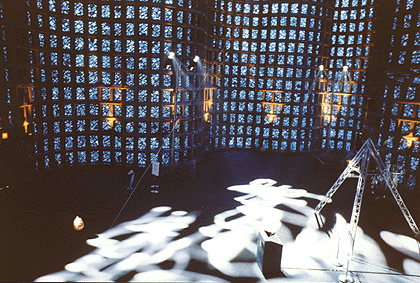LOST REFERENTIAL
proposes to project Artificial Life principles to an interactive kinetic
light architecture. A set of eight automated luminaries have their focal
point computed by a flocking (herd like) behavior algorithm. These lights
are not passive actors manipulated by direct interaction with the viewers.
They are true "living" characters, on a constant move, evolving
and reacting to the audience. The walls become a large sensory membrane,
as the installation utilizes a vast number of sensory cells (64) distributed
throughout the space periphery.
LOST REFERENTIAL challenges the crowd and the personal experience. One
single person controls the flow and evolution of the system by means
of his/her heartbeat. The crowd does, in turn, react and adapt to one's
beat and influence the swarming by its sole body presence. A total of
eight independent sound sources also accentuate the lifeliness of the
lighting and the heartbeat propagation.
A light cone shines on the heartbeat (medical ECG device) interface.
One person puts the sensor clip on his/her finger. The piece starts.
One beat after another, all the moving lights "pulse" their
intensity and move towards their next location. They all obey to this
improvised conductor. These states are derived from the crowd movement
around the space.
The motion detection systems computes crowd displacement and establishes
areas of interest. The area where there is the most disturbance becomes
the center of revolution of the swarm. The swarm either avoids this
area, revolves around it and then breaks into smaller swarms that revolves
on themselves. The program decides to skip or demultiply heart beats
in order to create tension and unstability. The program also reacts
to the racing of the beat, generating even more disturbance in the light
and sound.
The system memorizes crowd patterns thru time and utilizes it as navigating
material, synthesizing a virtual path from this turmoil of data. Divided
by group of four sensors, an array of 16 lights systematically incarnates
an histogram of activity depicted by regions of the wall brightness.
This gives a constant visual feedback to the crowd.

